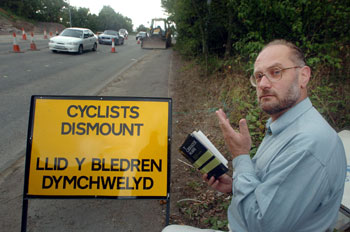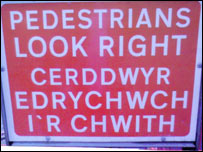August 18, 2006
How to baffle Welsh cyclists
 By
law, road signs in Wales must be printed in both English and Welsh. But
let's hope the highway authorities generally do a better job with
creating bilingual signs than they did with this unfortunate example between Penarth and Cardiff. Dymchwelyd may
mean 'dismount' (among other things),
but llid y bledren has
nothing to do with cyclists — in fact, it means 'bladder
inflammation.' Whoops! The mistranslation was first reported by
icWales and was soon picked up by BBC
and AFP for the entertainment of the rest of the world.
The best guess among red-faced local officials is that someone accidentally
entered cystitis instead of cyclists into an online
English-to-Welsh translator.
By
law, road signs in Wales must be printed in both English and Welsh. But
let's hope the highway authorities generally do a better job with
creating bilingual signs than they did with this unfortunate example between Penarth and Cardiff. Dymchwelyd may
mean 'dismount' (among other things),
but llid y bledren has
nothing to do with cyclists — in fact, it means 'bladder
inflammation.' Whoops! The mistranslation was first reported by
icWales and was soon picked up by BBC
and AFP for the entertainment of the rest of the world.
The best guess among red-faced local officials is that someone accidentally
entered cystitis instead of cyclists into an online
English-to-Welsh translator.
I can see how an online translator could have been partially to blame, but how
exactly does one accidentally enter cystitis
for cyclists? I wonder if
this might have been caused by the Cupertino
effect: first cyclists
was mistyped, then "corrected" by an automatic spellchecker to cystitis, and then finally
misrendered
into Welsh. If an online translation program were really involved, I
think a more likely explanation would be an error in the lexicon, with
the
translation equivalent for cystitis
erroneously duplicated for cyclist(s)
(especially if they're adjacent headwords). Or the whole thing could have
been human error, with the sign-writer consulting an English-Welsh
dictionary and taking the gloss from the wrong headword on the page.
Even if the correct translation equivalent for cyclists had been chosen, the
instruction on the sign
would still not have been grammatically well-formed, as one Welsh
language
activist told icWales:
Owain Sgiv, an officer for the Welsh language campaign group Cymdeithas yr Iaith Gymraeg, explained: 'Roughly translated, llid y bledren dymchwelyd means bladder disease has returned.
'But I have to stress that the order in which the words have been placed means the sentence makes no sense whatsoever.
'It certainly does not mean anything like cyclists dismount.'
'Cyclists dismount is an awkward sentence to translate as there is no Welsh word for dismount,' he added.
'But the correct translation would be something like dim beicio, which means literally no cycling, or man disgyn i feicwyr, which means fall-off area for cyclists.
Aran Jones, of Welsh Language group Cymuned, was equally baffled - although not for the first time.
He said: 'Llid y bledren means inflammation of the bladder.
'This sentence structure makes no sense, but dymchwelyd means return.
'This is a real peach. Road signs are mistranslated on an enormously regular basis, usually because people use online translators.
'But we don't often get them quite as insane as this.'
So dymchwelyd doesn't map
precisely to dismount in the
relevant sense, and furthermore, Welsh doesn't follow English in
allowing a noun phrase and uninflected verb to be construed as an
imperative (i.e., "Cyclists dismount" is understood as shorthand for
"Cyclists must/should dismount from their bicycles"). Such is the
danger of attempting a dictionary-aided word-for-word translation
without having any knowledge of the syntax of the target language. And
it's a danger that's clearly not limited to Chinese
menus.
[Update #1: John Wells writes in to say:
Actually, "Aran Jones, of Welsh Language group Cymuned" is wrong. DYMCHWELYD doesn't mean 'return' (that's DYCHWELYD). It means 'overthrow, upset, subvert', which I suppose is a lot closer to 'dismount' than 'return' would be.
But yes, LLID Y BLEDREN certainly doesn't mean 'cyclists', but (literally) 'inflammation [of] the bladder'. The word for bladder is PLEDREN, but since it is feminine its initial consonant mutates after the definite article. ]
[Update #2: This isn't the first time a mistranslated Welsh road sign has made the news. In January the BBC reported on this sign in Cardiff — unfortunately, the Welsh translation tells pedestrians to look to the left (chwith) instead of to the right.]
[Update #3: Regarding John Wells' comment above, Aran Jones emails to say that he received a media request inquiring about a road sign reading llid y bledren dychwelyd and responded accordingly. So it was evidently icWales that got dymchwelyd and dychwelyd confused.]
Posted by Benjamin Zimmer at August 18, 2006 01:32 PM